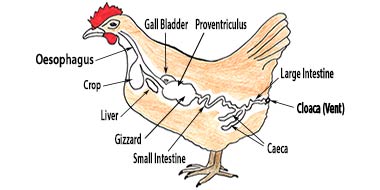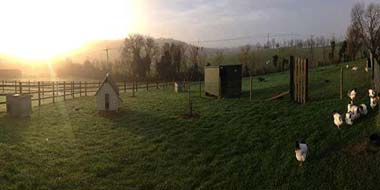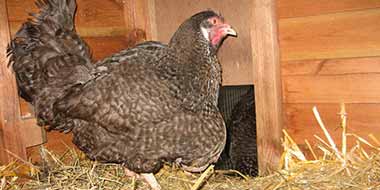Alongside respiratory disease- diarrhoea is one of the most common conditions to affect chickens kept on smallholdings or in domestic situations such as the back garden.
The causes of diarrhoea in poultry
Before we look at causes of diarrhoea it is worth mentioning that a normal bird dropping should be firm and brown with a white part on the top which is made from urates (the chicken’s urine) as chickens urinate and defecate in one motion.
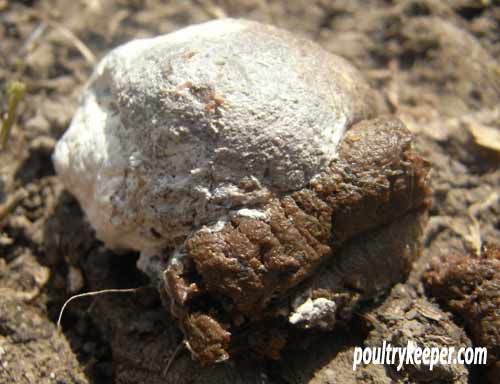
A healthy bird will also pass a caecal dropping every 10th dropping or so, these are usually caramel in colour. They are passed from the caeca instead of the large intestine, hence the difference in appearance.
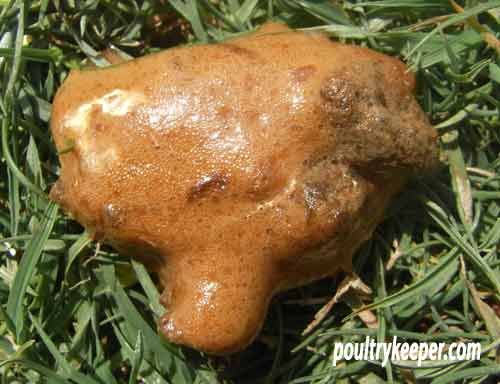
Any yellow foamy droppings or bloody droppings are abnormal.
There are a number of possible causes for diarrhoea in poultry:
- Coccidiosis
- Worms
- Viruses (such as rotavirus and adenovirus)
- Bacterial diarrhoea
- Kidney damage
- A feed too high in protein
I have previously discussed Coccidiosis in a more in-depth article, however, the important thing to remember with this disease is that it tends to cause bloody diarrhoea in poultry under 10 weeks of age, often affecting all the birds in the batch and in severe cases can lead to death. If you suspect your birds have coccidiosis seek veterinary help immediately. Note coccidiosis in turkeys rarely causes blood to appear in the droppings instead causing diarrhoea and dullness. If you want to rule in/out coccidiosis then you can get a worm droppings sample kit and send a dropping sample to us where we will tell you if there are worm eggs or coccidial oocysts (eggs) in your bird’s droppings.
Worms rarely cause diarrhoea in chickens but if they are present in large numbers they can irritate the gut causing secondary bacterial diarrhoea. If you have birds losing weight and have mild diarrhoea it is again always worth ruling out worms as a problem by sending a sample to our lab for a worm egg count or if the birds’ have not been wormed in the last 4 – 6 months then worming with Flubenvet would be a sensible course of action.
There are a number of viruses that can damage the gut causing diarrhoea such as rotavirus and adenovirus (in turkeys). As with all viruses, there are no medications that will stop the virus it literally is a matter of supporting the bird whilst it fights the virus itself. However, when a virus damages a bird’s intestine it allows harmful bacteria to grow out of control in the intestine leading to secondary bacterial diarrhoea.
Bacterial diarrhoea is simply a disruption in the normal balance of good and bad bacteria in the intestine. This cause often results in an overgrowth of harmful Clostridia bacteria. It is thought that there is usually an underlying reason for this disruption such as:
- Gut damage caused by worms, coccidiosis or viruses. (The damaged gut releases proteins which provide an ideal source of nutrients for Clostridia bacteria)
- A sudden change in diet (different foods encourage different bacterial species to grow in the gut and a sudden change in feed can cause a sudden and overwhelming change in gut bacteria)
- Dirty water, caused by dirty drinkers or birds drinking from muddy puddles. Unfortunately, birds love to do this but it literally means they are drinking lots of harmful bacteria.
- Mouldy feed (Mouldy feed contains fungal toxins which can cause gut damage). A common problem if the feed is stored incorrectly or you only keep a few birds and have struggled to get through a 20kg bag of feed before it has started to get a bit damp and mouldy.
Once the Clostridia takes hold it can damage the wall of the gut further leading to worsening diarrhoea. In severe cases, the wall of the gut can become so badly damaged that the bacteria can simply cross over from the gut to the blood causing blood poisoning which is usually fatal.
If chickens have suffered from Infectious Bronchitis Virus this can result in kidney damage, birds then suffering from this damage can produce excessive quantities of urine which mixes with the droppings before defecation causing them to be more watery than normal which causes owners to report diarrhoea.
There are a number of chicken owners out there (including my own brother!) using turkey feed for their chickens (as it contains more protein) in an attempt to get them to grow better but in reality, the chicken feed contains the correct levels of protein for chickens and using a feed with excessive levels of protein causes wetter droppings since the extra protein is converted into urates which cause the bird to drink more and urinate more leading to damp bedding and a waste of money.
Irrespective of the cause of diarrhoea it has a number of harmful effects:
- The damaged gut will absorb fewer nutrients than normal thus causing your bird to become lethargic and to lose weight
- More importantly, the gut cannot absorb as much water as normal allowing your bird to become dehydrated which can lead to death
- In severe cases, the damaged gut wall will allow bacteria to leave the gut and enter the bloodstream causing blood poisoning and death
- Diarrhoea leads to the bedding becoming both wet and contaminated leading to further discomfort for the affected bird and the flock. The contaminated bedding can become a source of infection for the rest of the flock.
The treatment of diarrhoea in poultry
When one of your birds has diarrhoea there are two important things to determine:
- Is the bird otherwise well apart from the diarrhoea? If the bird is looking dull or has any additional symptoms then it needs veterinary attention
- Is there blood in the diarrhoea? Blood in the diarrhoea often suggests the presence of coccidiosis and as such needs veterinary intervention to treat it appropriately.
If the bird has diarrhoea but is otherwise fine and is eating and drinking normally then there is no need to panic and below there are a number of things you can do to help your bird:
- If your bird hasn’t been dewormed in the past three to four months then either send a droppings sample off to look for worm eggs or worm your bird with Flubenvet.
- The most important thing to do with birds with diarrhoea is to keep them hydrated.
- Anilyte C can be given to your birds drinking water to help keep them hydrated. It contains electrolytes to maintain the normal electrolyte balance in the gut and aniseed which gives the water a pleasant taste thus encouraging your dehydrated bird to drink. The pleasant taste of Anilyte C means it is very useful to mix in with any in-water medication prescribed by your vet since many medicines taste bad and birds are often reluctant to drink it. Anilyte C should be given in drinking water for five days.
- Biostop is a product made from a plant extract containing tannins which helps bind up loose droppings. Biostop can be given to birds suffering from mild cases of diarrhoea when antibiotics are not indicated. Biostop is very safe and can be given to the entire flock.
- After Biostop, give the bird a dose of Beryl’s Friendly Bacteria to help repopulate the gut with friendly bacteria and to displace the harmful bacteria.
- Always ensure that your birds have fresh clean drinking water.
- Always ensure your birds have some fresh feed which should ideally be a commercial mash or pellet.
- Cut down on treats as when given in excess these can encourage the growth of harmful bacteria in the gut.
- Always ensure that any wet bedding is removed and that it is replaced with fresh clean dry bedding. This will keep your birds comfortable and will stop the bedding from becoming contaminated which could be a potential source of infection for your other birds.
After you have the diarrhoea controlled your bird will likely have lost a lot of weight.
Chicken Vet Amino + is a multivitamin product containing amino acids (the building blocks of protein) and B vitamins to help build up your recovering bird. It can be given in water for five days.
Chicken Vet Energy contains L-Carnitine to stimulate your bird’s appetite. It also can be given in water daily for five days. I would suggest it might be worth mixing the two products together for a five-day course once your bird has stopped scouring.
Preventing diarrhoea
There are a number of simple steps you can take to prevent diarrhoea in your birds:
- Feed your birds a commercial pellet (one designed for the correct species!!!) or mash with very few treats
- Ensure feed is fresh, dry and in date.
 Always ensure your birds have access to fresh drinking water.
Always ensure your birds have access to fresh drinking water.- Try to get rid of puddles in the range since these often contain lots of harmful bacteria and for some reason, birds like to drink from them rather than their drinkers.
- Regularly clean and disinfect your poultry coop using a detergent followed by an approved disinfectant such as Interkokask
- Always worm your birds with Flubenvet at least every six months and ideally every three months. If you are not sure about the worming status or you want to check if your bird’s need to be wormed then use a Faeces Sample Kit.
- Give Beryl’s friendly bacteria every six weeks to top up the good bacteria in your birds gut
- Give your bird Digesti-Health daily in its feed. This contains Biomos to absorb fungal toxins, mannan oligosaccharides to bind to harmful bacteria thus stopping them from binding to the gut and chelated minerals allowing them to be more readily absorbed.

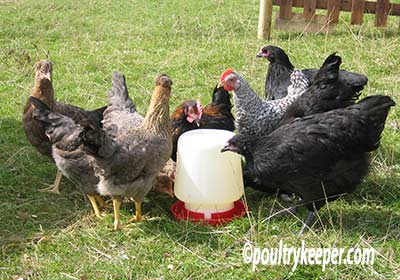 Always ensure your birds have access to
Always ensure your birds have access to 